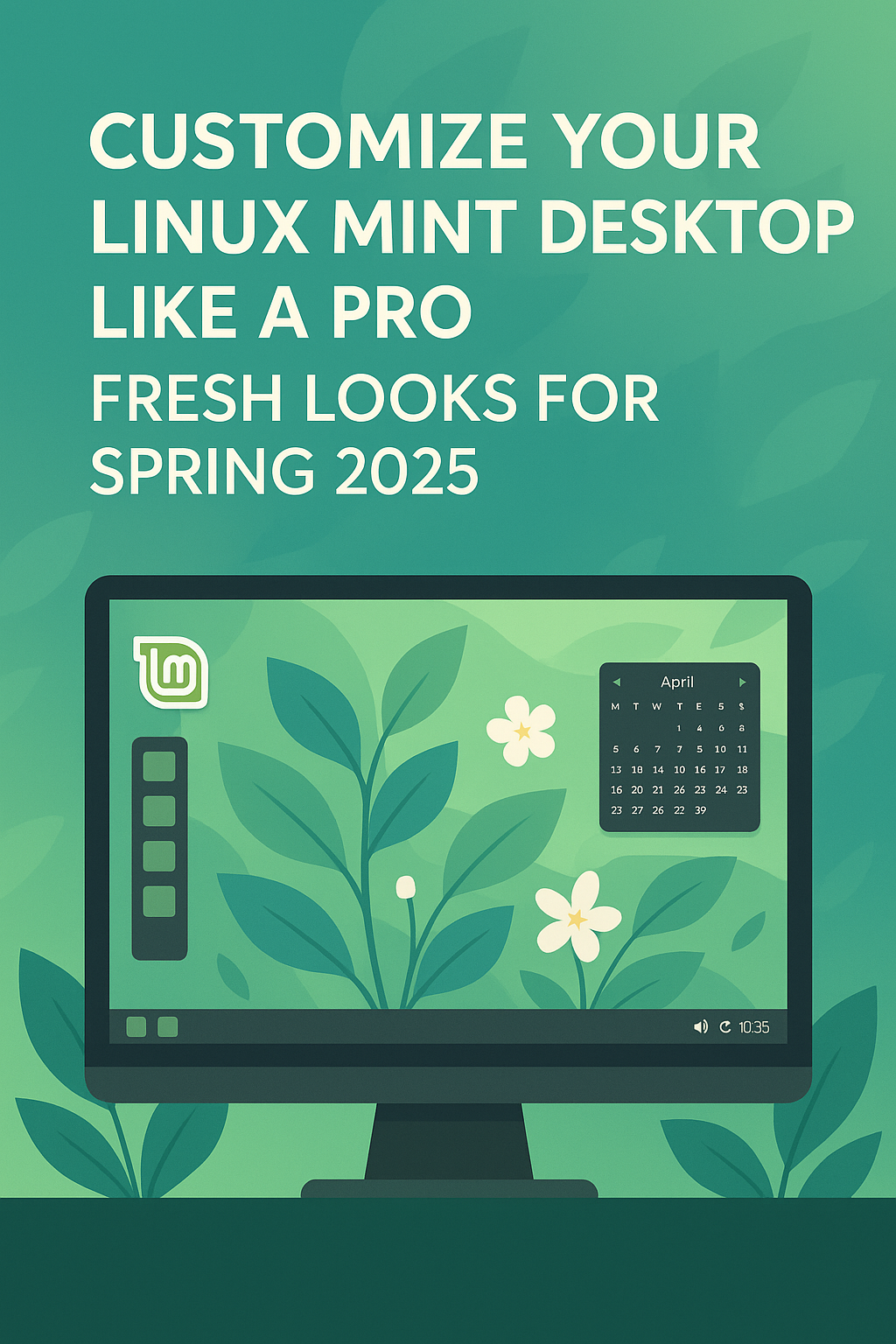
Customize Your Linux Mint Desktop Like a Pro: Fresh Looks for Spring 2025
Spring is here, and what better time to give your Linux Mint desktop a fresh new vibe? Whether you're a total newbie or a semi-pro tinkerer, there's something deeply satisfying about breathing new life into your digital workspace. Think of it like spring cleaning—only geekier and way more fun.
Why Customize Your Linux Mint Desktop?
Let’s face it: the default setup of Linux Mint is clean, functional, and… well, a little plain. But the magic of Linux lies in how insanely customizable it is. Imagine your desktop as a blank canvas and you’re the digital Picasso, crafting your own masterpiece.
Getting Started: What You'll Need
Before we jump in, you’ll need a few basics in place:
- A running Linux Mint system (Cinnamon, MATE, or Xfce)
- Internet connection
- A sprinkle of curiosity
- Basic understanding of how to install software on Linux Mint
Update Before You Customize
Rule number one? Always update your system. You don’t want to hit snags while customizing because of outdated packages.
sudo apt update && sudo apt upgradeBackup: Just In Case
Think of this as your parachute before skydiving into the world of tweaks. Use Timeshift—one of the best Linux Mint apps—to create a system snapshot.
Top 10 Things to Do After Installing Linux Mint
This isn't just about making things look good—it's about functionality too. Here's where you begin:
1. Install Mint Tweaks
sudo apt install mintinstall will give you access to tons of customization tools right from the Software Manager.
2. Add Beautiful Themes
Themes are your desktop’s fashion statement. Want a dark Dracula vibe or a pastel spring palette? Head to System Settings → Themes.
3. Use Open Source Tools for Icon Packs
Try Numix, Papirus, or Tela icons. They make your system pop like confetti at a celebration.
4. Customize Your Cinnamon Desktop Like a Pro
Cinnamon users, rejoice! The built-in settings allow you to tweak panels, applets, and desklets till you’re giddy.
5. Install a Dock
Cairo Dock or Plank adds that macOS-like aesthetic. It’s smooth, functional, and flat-out cool.
6. Set Up Hot Corners
Make your screen feel alive. Assign actions to your screen corners—like opening the workspace switcher or showing the desktop.
7. Download New Fonts
Fonts change everything. Try Google Fonts or Nerd Fonts to freshen up your typography game.
8. Switch Up the Login Screen
Login Window settings let you pick themes, background images, and even tweak the user panel.
9. Add Useful Linux Mint Terminal Commands to Your Arsenal
Don't fear the terminal. Commands like neofetch and htop give you cool insights and control under the hood.
10. Install Best Apps to Enhance Your Mint Experience
- Stacer - System optimizer
- GIMP - Open-source Photoshop alternative
- Krita - Digital art wizardry
- Synaptic - Advanced package manager
Personalize Your Desktop Wallpaper
It’s the quickest way to change the mood. Try Wallhaven or Unsplash for stunning open-source backgrounds. Or use live wallpapers if your system can handle them.
Use Applets and Desklets
Want a calendar widget or system monitor on your desktop? Cinnamon's applets and desklets are your best friends.
Configure Your Panels Like a Ninja
Move panels to the top, bottom, or sides. Add launchers, separators, or even system monitors. It’s your playground.
Play With Transparency and Effects
Give your desktop a glassy look with transparent panels and blur effects. It’s like giving your system a fresh coat of digital paint.
Fix Common Linux Mint Update Errors
Ran into a snag? Try this classic fix:
sudo dpkg --configure -aStill stuck? Reboot and run sudo apt --fix-broken install.
Fix Linux Mint Boot Issues
If your system isn’t booting properly, don’t panic. Boot into Recovery Mode or use a live USB to reinstall GRUB.
Turn Your Desktop Into a Productivity Beast
Want a tiling window manager vibe without leaving Cinnamon? Try tools like gTile or Devilspie2.
Try Minimalist Desktop Setups
Sometimes less is more. Remove panels, hide icons, use keyboard shortcuts. It feels clean, sharp, and futuristic—like a digital zen garden.
Explore Free Software That Supercharges Your Workflow
Think LibreOffice, VLC, BleachBit. These open-source tools turn your Linux Mint machine into a powerhouse without spending a dime.
Why Linux Mint Is Great for Beginners
It’s like training wheels for the Linux world—without feeling like it. Stable, intuitive, and backed by a solid community of enthusiasts always ready to help.
Conclusion: Spring into a New Mint Experience
Your desktop isn’t just a screen—it’s your digital habitat. Make it comfy. Make it fun. Make it you. Whether you’re hunting for the best Linux Mint apps, diving into Linux Mint beginner tutorials, or learning how to install software on Linux Mint for the first time, the road to customization is full of discovery.
And remember—don’t just follow the guide. Make it your own. Play. Tweak. Break. Fix. Repeat. That’s the true spirit of Linux Mint.
FAQs
How do I install new themes in Linux Mint?
You can install themes from System Settings → Themes → Add/Remove or download them manually from sites like gnome-look.org.
What are some must-have Linux Mint apps?
Some favorites include Stacer, GIMP, VLC, Synaptic, and Timeshift. These boost both performance and functionality.
How do I fix Linux Mint boot issues?
Boot into a live session using a USB and use Boot Repair, or reinstall GRUB via terminal. A quick online search with your error message helps too.
Is Linux Mint good for beginners?
Absolutely! It’s one of the most user-friendly Linux distros with a familiar interface and tons of community support.
Can I customize Linux Mint without using the terminal?
Yes! Most customizations—like themes, icons, panels, and applets—can be done through the GUI without touching the terminal.